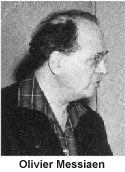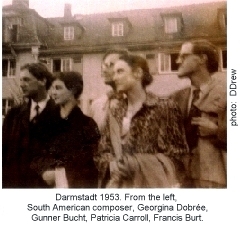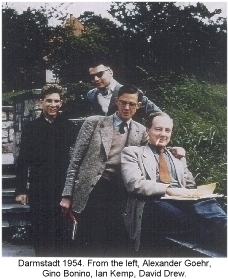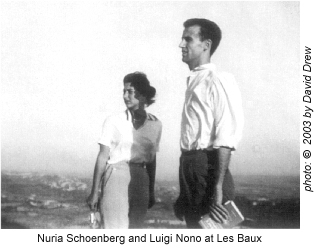 |
David Drew
British writer, editor, music publisher, recording
producer
Annual Records 1953-55
William Glock, Dartington Summer School for
Music, Darmstadt New Music Courses,
The Score, Messaien, Gerhard,
Nono, Decca, EMI |
|
| 1953 |
22 June: Writes to
William Glock, introducing himself, enclosing a recent article, offering
to contribute a review to The Score, and commenting on Glock's recent
series of talks for the BBC's Third Programme ('Studies in Music Criticism')
with particular reference to the focal talk on Stravinsky.
 July: To Darmstadt and the New Music courses, with Ian Kemp
and the clarinettist, Georgina Dobrée. Friendly arguments with
Swedish composer Gunnar Bucht, and the British composer Francis Burt
(currently studying in Berlin with Boris Blacher). July: To Darmstadt and the New Music courses, with Ian Kemp
and the clarinettist, Georgina Dobrée. Friendly arguments with
Swedish composer Gunnar Bucht, and the British composer Francis Burt
(currently studying in Berlin with Boris Blacher).
September: returns to
London and together with his Cambridge friend, the New Zealand composer
David Farquhar, rents two rooms in the large and rambling apartment in
St John's Wood belonging to Miles Tomalin. Miles's son Nicholas is a
another Cambridge friend now on the threshold of a brilliant career in
investigative journalism (one that will be tragically cut short). Miles is a
former pupil of Arnold Dolmetsch, a gifted musician, a well-known writer and
journalist, and a veteran of the Spanish Civil War (in which he fought with the
International Brigade). A heaven-sent landlord, he scarcely raises an eyebrow
at all manner of provocations - including the sudden arrival of a concert-grand
lent by Francis Burt, and D's incompetent strummings thereon. (Later, John
Ogdon's sight-reading of two formidably complex scores from Darmstadt will rock
the entire apartment, without a murmur of protest from Miles).
Dennis Dobson
introduces D to the poet and editor Geoffrey Grigson, with a view to a
collaboration. An education in the twin crafts of writing and editing, it
proves invaluable: for the next six years, musical journalism and commercial
work for major record labels will be D's main source of income.
|
| 1954-57 |
Liner-notes for EMI and
other major record labels. Commissions from Robert Boas at the Decca
Record Company lead to a two-year part-time engagement with Decca and its
Publicity Department, where D's colleagues include Quita Chavez, and two key
figures from the world of jazz and popular music: Alexis Korner, and Peter
Clayton. Brochures for the upmarket Oiseau Lyre catalogue, with its emphasis on
Couperin, Rameau, Charpentier, etc, make a welcome contrast to some of Decca's
well-meaning imports from Scandinavia and the Balkans. With John Culshaw and
his great opera projects there are personal links, but no professional ones.
From the Decca period, the one tangible product will be a substantial reference
book on the role of music in ballet (see 1958).
Other commercial work of the
late 1950s: copious music journalism for national and Scottish press; articles
and reviews for The Musical Times, Music & Letters etc,
frequent broadcasts, particularly Anna Instone's and Julian Herbage's popular
Sunday-morning programme, Music Magazine. Through Hans Seelig, is
invited by the German-American conductor, music critic, and editor, Henry
Levinger, to act as London correspondent of the Musical
Courier.
An avid interest in American
music of every kind is sustained by the music-library and record-library at the
U.S. Information Centre in Grosvenor Square (librarian, Margaret Haferd), and
by the repertory of visiting American dance companies.
|
| 1954 |
July: Second visit to
Darmstadt with Ian Kemp. As observer, attends the piano classes of
Eduard Steuermann and Yvonne Loriod, and the composition class of Messaien.
Listens uncomprehendingly to Adorno, and sympathetically to René
Leibowitz. Meets Luigi Nono, Bruno Maderna, Krenek, Henri Pousseur, and
young composers including Alexander Goehr and Harrison
Birtwistle.
August: At the
Dartington Summer School in Music, gives a talk on Messiaen. Glock - for
whom Stravinsky remains the contemporary figurehead (and Messiaen
understandably suspect) - has accepted D's offer of a Messiaen article for
The Score. Until now, no major article on the composer has been
published anywhere. Before long, D finds that the subject is too large for a
single article, and Glock magnanimously agrees. Messiaen - A Provisional
Study (I) is published in the December issue of The Score,
together with D's Darmstadt review. By the spring of 1955, work on a second
Messiaen article will have revealed a need for a third one.
September: David
Farquhar has completed his composition studies with Benjamin Frankel and
returned to New Zealand; his successor in the Tomalin ménage is Ian
Kemp, down from Cambridge and already working at Schott-London with
Howard Hartog and Walter Bergmann.

|
| 1955 |
Music politics in the UK
(i.e. London) are becoming increasingly complex and centralised. Since the
previous September, The Score has established links with the
International Music Association (I.M.A.), whose headquarters is a club in South
Audley Street which for a while becomes a haven for indigent young composers
and writers, and a home for Composer's Concourse, a forum established by
Glock's close friends Elisabeth Lutyens and Edward Clark. One of the guest
speakers at the forum is O.W. Neighbour, Deputy Head and future Head of
the Music Library in the British Museum. Neighbour is known as a
'Schoenbergian", but his musical horizons ar very broad, as are those of his
composer-friend Christopher Shaw. To Neighbour's musical judgement and
advice D will be much endebted in future years.
June: D's publication
of Messiaen II is held over; instead The Score publishes
his review of Bernstein's Broadway musical Wonderful Town. Its
inclusion has already provided an opportunity for D to help bring about an
eventual rapprochement between Glock and Hans Keller, who until
now has been highly critical of The Score and its editor (with whom he
is not yet personally acquainted): Keller contributes an article on Bernstein's
score for the film On the Waterfront. In a TV interview with Huw Weldon,
Bernstein berates the music press but is complementary about the
contributions to The Score.
17-21 June: In
Baden-Baden for 29th ISCM Festival and specifically for the world premiere,
under Hans Rosbaud, of the First Symphony by Roberto Gerhard. Glock and
Francis Burt also attend. Blacher is there for his
Orchester-Ornament (and is introduced to D by Burt), and
Mátyás Seiber for his 3rd String Quartet (discussions with
Seiber about Weill). The festival is dominated by the performance and
reception of Le Marteau sans Maître by Pierre Boulez.
Summer: Third and last
visit to Darmstadt. In August, attends the Aix-en-Provence Festival for The
Daily Telegraph; excursions with Luigi Nono and Nuria
Schoenberg.
 September/December: Messiaen - A Provisional
Study , parts II and III, in The Score (numbers 13 and 14).
|
|

 July: To Darmstadt and the New Music courses, with Ian Kemp
and the clarinettist, Georgina Dobrée. Friendly arguments with
Swedish composer Gunnar Bucht, and the British composer Francis Burt
(currently studying in Berlin with Boris Blacher).
July: To Darmstadt and the New Music courses, with Ian Kemp
and the clarinettist, Georgina Dobrée. Friendly arguments with
Swedish composer Gunnar Bucht, and the British composer Francis Burt
(currently studying in Berlin with Boris Blacher).
